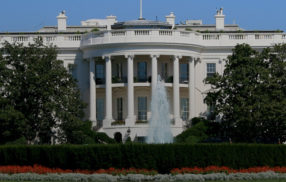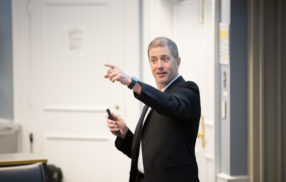
Think Before You Tweet: Darden Communications Council Examines When CEOs Should Weigh-in on Controversies
By Jay Hodgkins
The University of Virginia Darden School of Business launched its Leadership Communications Council this fall, and the inaugural meeting included a session led by National Preparedness Leadership Initiative Director of Research Eric McNulty on when CEOs should take to mediums like Twitter to publicly weigh-in on social controversies.
In a recent post on Strategy+Business, the publication managed by PwC’s Strategy& group, McNulty distilled the key insights from the council on when senior executives can wade into social issues and how to make sure they do so effectively on behalf of their companies.
Stick to the core. One contributor noted that it is one thing to join a conversation and quite another to be a relevant participant. A transportation company should be expected to have a point of view on climate change, for example, because it uses fossil fuels. Several have been quite active on this front as they see the cost-saving benefits of decreasing energy consumption and adopting alternative energy sources that have become more affordable. Energy efficiency and sustainability benefit the company and its customers through lower costs — and help satisfy its environmentally concerned workers, customers, and communities. By contrast, those same companies may have neither credibility nor a compelling business interest in the controversy over police violence.
The opportunity lies in having a serious internal conversation about the intersection between the issue, the business, and stakeholders. Done rigorously, it can reveal productive ways to engage or pitfalls to avoid.
Start with your practices. Before saying anything, make sure that the corporate house is in order from the boardroom to the front lines. One participant noted that actions speak far louder than words when it comes to issues such as race and gender equality and LGBTQ rights. Another said that alignment between “walk and talk” and consistency over time mean more than any ad, press release, or social media post in response to the eruption of the moment.
Taking a hard look internally is a chance to learn more about your organization and the people on which it depends. You will discover what matters to them about what you do — and what may be important only to a small, though vocal, group of activists.
Remember that people are people, not just consumers (or employees). It is too easy in business circles to think of customers as demographic slices along the single dimension of buying behavior. Customers, along with workers and other constituencies, are multifaceted human beings. Social issues can transcend one or more roles. A participant said that few people expect companies to be perfect but they do expect them to be respectful. “You gain a lot of credibility if you are willing to listen and respond to what you hear,” the participant said. “It’s about cultivating a relationship, not simply crafting a narrative.”
Read the full story on Strategy+Business.
The Darden Leadership Communications Council is led by Professor June West and Darden’s Management Communication faculty.
The University of Virginia Darden School of Business prepares responsible global leaders through unparalleled transformational learning experiences. Darden’s graduate degree programs (MBA, MSBA and Ph.D.) and Executive Education & Lifelong Learning programs offered by the Darden School Foundation set the stage for a lifetime of career advancement and impact. Darden’s top-ranked faculty, renowned for teaching excellence, inspires and shapes modern business leadership worldwide through research, thought leadership and business publishing. Darden has Grounds in Charlottesville, Virginia, and the Washington, D.C., area and a global community that includes 18,000 alumni in 90 countries. Darden was established in 1955 at the University of Virginia, a top public university founded by Thomas Jefferson in 1819 in Charlottesville, Virginia.
Press Contact
Molly Mitchell
Senior Associate Director, Editorial and Media Relations
Darden School of Business
University of Virginia
MitchellM@darden.virginia.edu







